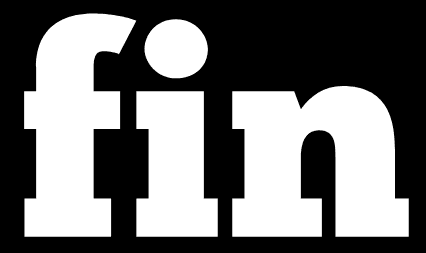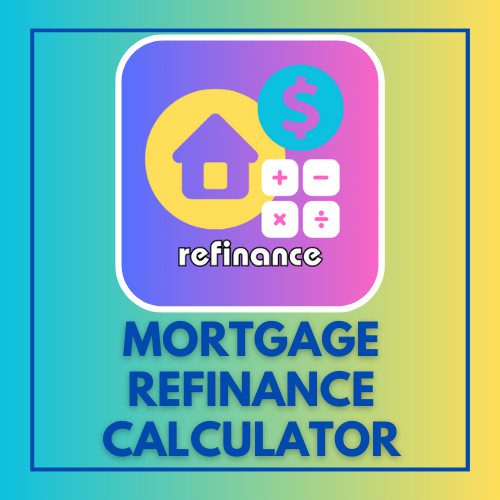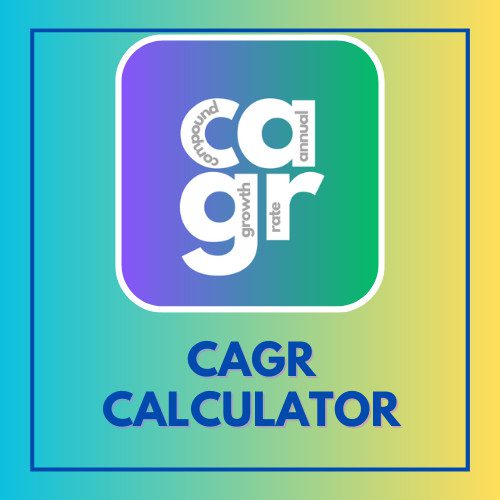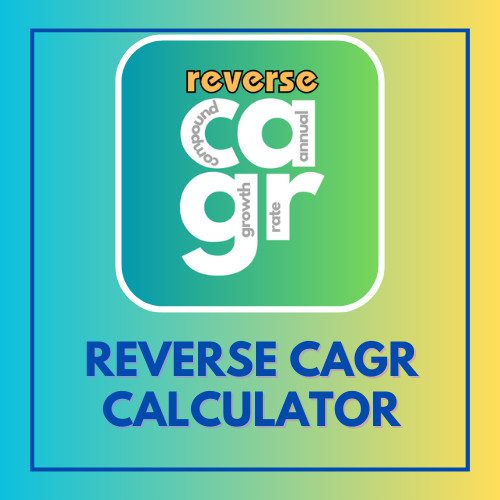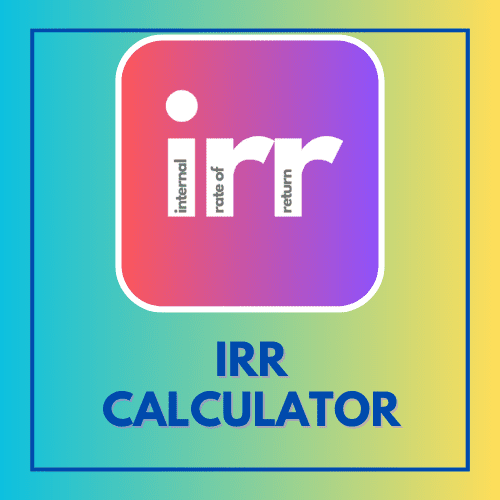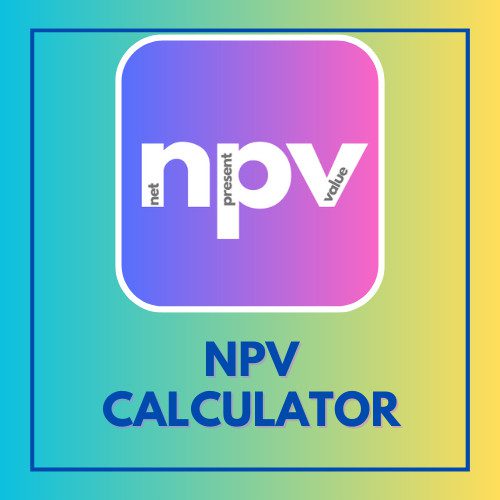This article has been reviewed by Sumeet Sinha, MBA (Emory University Goizueta Business School). Should you have any inquiries, please do not hesitate to contact at sumeet@finlightened.com.
Understanding Insurance is a very important financial skill. Insurance is a ubiquitous financial tool that serves to protect individuals and entities from unforeseen losses. For every valuable asset, hobby, or venture, there’s likely an insurance policy tailored to cover it. In this piece, I will dissect and explain some niche types of insurance policies, helping you understand their importance and relevance in today’s ever-evolving world.
Unique Insurance Types
Let’s take a look at some of the unique and uncommon types of insurance.
Private Jet Insurance
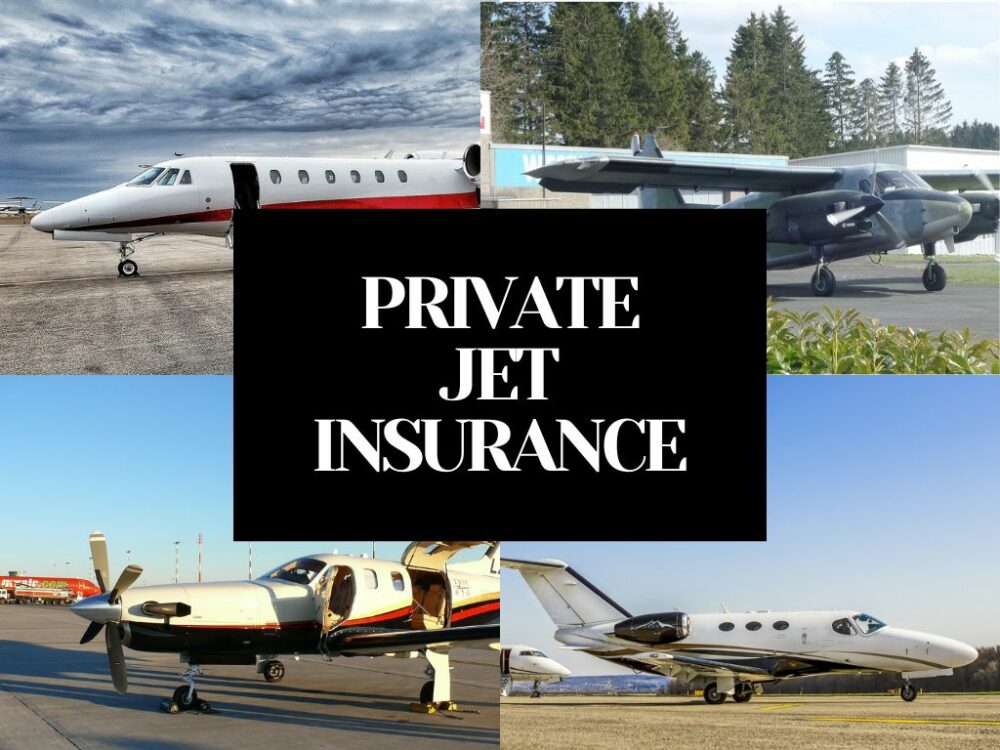
Definition: Coverage designed specifically for private jet owners to protect against potential risks such as damages, liability, and more.
Example: If a private jet encounters unexpected turbulence causing damage, the insurance policy would cover repair costs.
Private jet insurance typically covers risks associated with owning and operating a private aircraft. Factors influencing insurance premiums include:
- Value of the Aircraft: Just as with car insurance, the more expensive the aircraft, the higher the cost of insuring it.
- Usage: An aircraft used for commercial purposes (like charter flights) often requires different coverage and will typically cost more to insure than one used strictly for personal use.
- Pilot Experience and Training: Experienced pilots with significant flight hours and ongoing training might be quoted lower premiums compared to less experienced pilots.
- Coverage Type: As with any insurance, the broader the coverage, the higher the premium. This can include liability coverage, hull insurance, medical payments, etc.
- Geographic Region: Where the plane is usually stored, and the areas it frequently flies to, can influence insurance costs. Areas with adverse weather conditions or higher risk might result in higher premiums.
- Claims History: An owner or pilot with a history of previous claims may face higher insurance premiums.
Mortgage Impairment Insurance

Definition: A protection for lenders against losses if a property suffers damage and the borrower’s property insurance doesn’t cover the full amount.
Example: A house is destroyed by an event not covered under the borrower’s policy. The lender can claim the remaining mortgage amount under this insurance.
Mortgage impairment insurance is a type of policy designed to protect a lender’s interest in a property, particularly when there are lapses in a borrower’s hazard insurance. In essence, it acts as a safety net for lenders, ensuring that their financial interest in the property is safeguarded even if the borrower’s own policy fails to provide adequate coverage or has lapsed.
This type of insurance typically covers perils such as fires, floods, or other events that can damage a property, but its specifics can vary depending on the insurer and the terms of the policy. Mortgage impairment insurance may also provide coverage for errors and omissions related to tracking and managing the hazard insurance policies of borrowers.
Motorcycle Rental Insurance
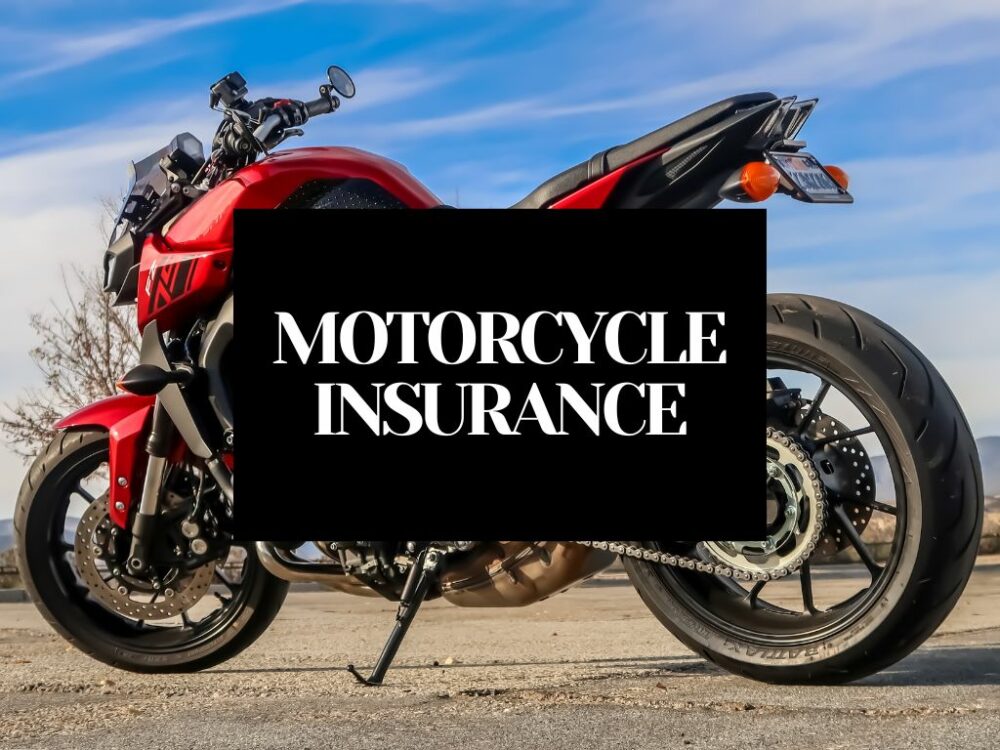
Definition: Insurance coverage for rented motorcycles, offering protection against damage, theft, and liability.
Example: A tourist rents a motorcycle, which is later stolen. The rental insurance helps cover replacement costs.
When renting a motorcycle, insurance is a vital consideration. Just as with renting a car, rental companies often offer various insurance options to cover potential risks. Here’s a brief rundown of what you might encounter:
- Collision Damage Waiver (CDW) or Loss Damage Waiver (LDW):
- This is not technically insurance but rather a waiver. It means the rental company waives the right to charge the renter for collision damage to the rented motorcycle.
- It may come with a deductible, meaning you’ll still be liable for a certain amount of the repair costs if there’s damage.
- Liability Insurance:
- This covers damage to other vehicles, property, or injuries to other persons caused by an accident while you’re riding the rented motorcycle.
- There’s typically a maximum coverage amount, and any costs exceeding this would be the renter’s responsibility.
- Personal Accident Insurance (PAI):
- This covers medical expenses for the rider (and sometimes the passenger) if involved in an accident.
- Personal Effects Coverage (PEC):
- This covers the personal belongings you carry on the motorcycle, protecting against theft or damage.
- Supplemental Liability Insurance (SLI):
- Offers additional liability protection beyond the basic coverage, increasing the maximum amount the insurance will cover in case of an accident.
- Uninsured/Underinsured Motorist Protection:
- Provides coverage if you’re involved in an accident with a motorist who doesn’t have adequate insurance.
Scaffolding Insurance

Definition: Coverage for businesses in the scaffolding industry, protecting against damages, injuries, and other liabilities.
Example: A scaffold collapses at a construction site, injuring several workers. The insurance covers medical and potential legal costs.
Scaffolding insurance typically provides coverage for businesses that set up, dismantle, or work with scaffolding. These policies might encompass:
Bestseller Personal Finance Books
- Public Liability Insurance: This covers any third-party injury or damage claims that could arise from your scaffolding operations.
- Employer’s Liability Insurance: If you employ staff, this is usually a legal requirement in many countries. It protects you from claims if your staff gets injured or sick because of the work they do for you.
- Products Liability: Coverage for any injury or damage caused by a product your business has supplied or sold.
- Tools & Equipment Insurance: Protects against the theft, loss, or damage of tools and equipment.
- Contract Works Insurance: Covers the cost of repairing or redoing work in progress that’s damaged due to an insured event.
The cost of scaffolding insurance can vary based on several factors including the size of the business, location, the nature of projects undertaken, and claim history.
Party Rental Insurance

Definition: Insurance for businesses renting out party equipment like chairs, tents, and sound systems, protecting against damage or loss.
Example: During a storm, rented tents and chairs are damaged. The insurance compensates the rental company.
Party rental insurance is a form of specialized coverage designed for businesses that rent out equipment and supplies for events such as weddings, birthday parties, corporate events, and more. This coverage protects the business from various risks associated with their rental items.
1. What Does It Cover? The specifics of what party rental insurance covers can vary based on the provider and the chosen policy, but typically, it might include:
- Property Damage: Protection against damage to the rented items. This could be anything from chairs and tables to high-end audio-visual equipment.
- General Liability: This covers claims against the rental company for bodily injury or property damage resulting from the rented items. For example, if a rented tent collapses and injures someone, this coverage would apply.
- Lost or Stolen Equipment: Coverage in case rental items are lost or stolen while in the possession of the renter.
- Business Interruption: In some cases, this could cover lost income if the business has to halt operations due to a covered peril.
2. Why is it Important? For businesses in the party rental industry, their inventory is a significant asset. Damage, loss, or liability claims related to this inventory could result in substantial financial strain. Party rental insurance helps mitigate these risks and ensures that the business can continue to operate even in the face of unforeseen events.
3. Cost Factors: The cost of party rental insurance varies based on several factors:
- Value of Inventory: Naturally, the more valuable your rental items, the higher the premium.
- Type of Items Rented: Riskier items, such as inflatables or high-end electronics, might attract a higher premium.
- Location: Areas prone to certain natural disasters or with higher crime rates might see increased rates.
- Claims History: Companies with fewer past claims might receive better rates.
4. How to Get Party Rental Insurance: Businesses interested in this type of coverage should reach out to insurance providers who specialize in commercial or business insurance. It’s beneficial to get multiple quotes and carefully review policy details to ensure appropriate coverage.
Conclusion: Party rental insurance is a prudent investment for businesses in the event rental space. Given the potential risks associated with renting out equipment and supplies, having a comprehensive insurance policy ensures that the business is protected from substantial financial burdens arising from damage, loss, or liability claims.
Golf Cart Rental Insurance
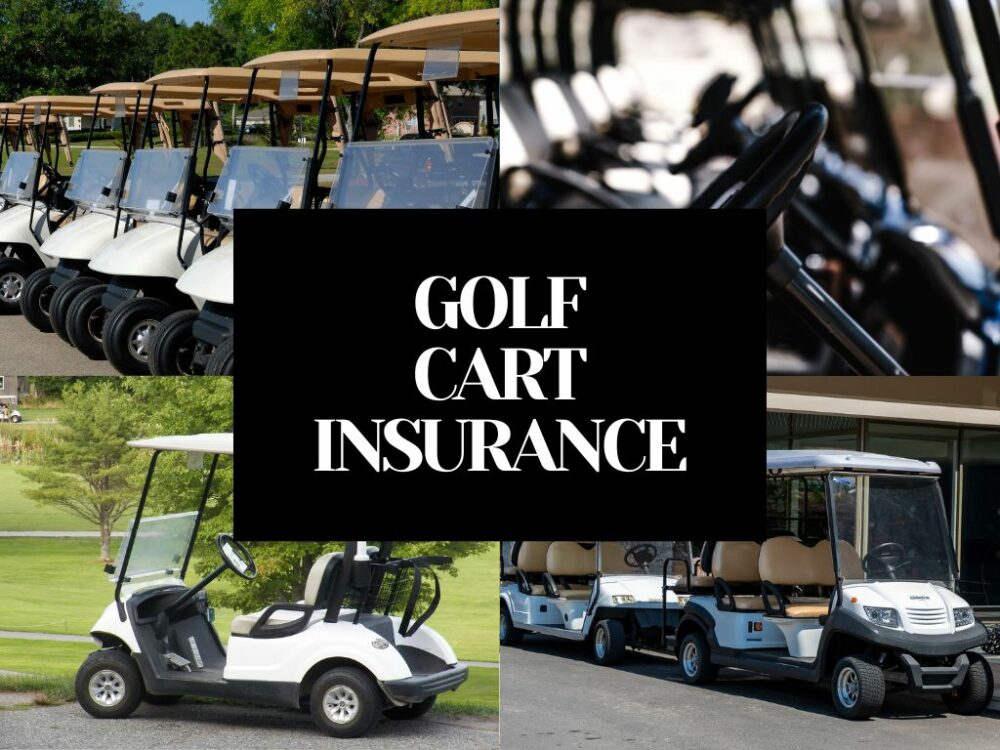
Definition: Coverage for rented golf carts, offering protection against potential damages, theft, and liability.
Example: A rented golf cart accidentally damages a course’s green. The rental insurance foots the repair bill.
Golf cart rental insurance provides coverage for businesses that rent out golf carts to individuals, either for use on a golf course or for transportation purposes in certain communities. The insurance might cover:
- Liability coverage: This protects the business if a renter injures someone or damages property while using the rented golf cart.
- Collision coverage: This covers repairs or the replacement of the golf cart if a renter is involved in a collision.
- Comprehensive coverage: This covers non-collision-related damages, such as theft, vandalism, or natural disasters.
The cost and specific coverages of golf cart rental insurance can vary depending on various factors, such as the location of the business, the number of carts, the usage purpose, and the chosen deductible and policy limits.
Exotic Car Rental Insurance

Definition: Designed for luxury and exotic vehicle rentals, this policy covers damages, theft, and liability.
Example: A rented Lamborghini gets into an accident. The exotic car rental insurance helps cover the extensive repair costs.
Exotic car rental insurance is a specialized type of insurance coverage for those who are renting high-end, luxury, or exotic vehicles. Due to the high value of these cars, insurance is imperative. Here are some general points to consider:
- High Cost: Exotic cars are significantly more expensive than typical vehicles. Thus, potential repair costs in the event of damage or the cost of replacement in case of total loss can be quite high.
- Liability: Even if you have personal auto insurance, it may not fully cover the costs associated with an accident in an exotic car. This is especially true for liability coverage, which may be quickly exceeded given the potential value of damages.
- Additional Coverage: Many exotic car rental companies may require renters to have additional insurance coverage, or they might offer their own coverage at a premium rate. This coverage can include collision damage waivers (CDW) or loss damage waivers (LDW).
- Personal Insurance: Before renting, it’s a good idea to check with your personal auto insurance provider. Some policies may offer coverage for rental cars, including exotic ones. However, remember that any claim made could affect your personal insurance premiums.
- Credit Card Coverage: Some premium credit cards offer rental car insurance as a benefit. Check the specifics of your card’s policy to see if exotic car rentals are covered and to what extent.
- Third-Party Insurance: There are third-party insurers who offer policies specifically for rental cars, including exotic vehicles.
- Deductibles: If purchasing coverage through the rental company, be sure to ask about deductibles. Some may have high deductibles in the event of an accident.
Jet Ski Rental Insurance
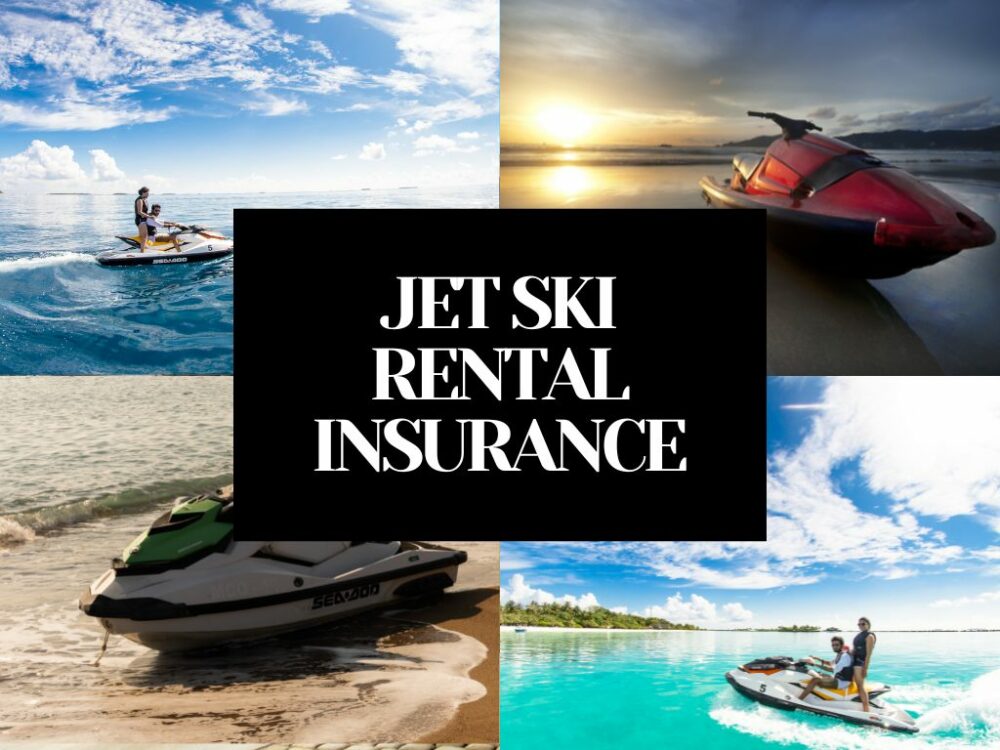
Definition: Insurance coverage for rented jet skis, providing protection against potential damages, theft, and liability.
Example: A rented jet ski collides with a boat. The insurance pays for repairs.
Jet ski rental insurance is essential for businesses renting out jet skis to customers, as it provides protection against various risks associated with this type of business.
- Coverage Types:
- Liability Coverage: This is one of the most crucial coverages for jet ski rental businesses. It protects the business in case a renter or third party gets injured or if there’s property damage caused by a rented jet ski.
- Physical Damage Coverage: This covers damage to the jet skis themselves, whether from accidents, vandalism, or other covered events.
- Medical Payments Coverage: This can cover medical expenses in case a renter gets injured while using the jet ski.
- Watercraft Liability: This is specialized liability coverage for watercraft. It’s essential for jet ski rentals due to the unique risks associated with watercraft.
- Factors Affecting Premiums:
- Location: The area where the business operates, especially if it’s a high-traffic tourist area, can impact rates.
- Type of Jet Skis: High-performance jet skis might have higher premiums due to increased risks.
- Safety Measures: Businesses that provide safety training or have strict safety measures in place might get lower rates.
- Claim History: A business with a history of numerous claims may face higher premiums.
- Additional Considerations:
- Many insurance providers will require the rental business to have certain safety and operational practices in place. This can include mandatory life jacket usage, safety briefings for renters, age restrictions, and more.
- Some policies may have exclusions, such as not covering damages or injuries that occur during racing or stunts. It’s essential to read the policy details carefully.
Hobby Drone Insurance

Definition: Coverage for personal drones used recreationally, protecting against damages, losses, and third-party liabilities.
Example: A hobbyist’s drone crashes into a neighbor’s window. The insurance covers window replacement.
1. Why Consider Insurance for Hobby Drones? Hobby drones, also known as recreational drones, have become increasingly popular over the past few years. As their popularity has grown, so have concerns about potential accidents, damage to the drone, or harm to other people’s property or even personal injury. Insurance can help cover these risks.
2. Types of Coverage: There are primarily two types of insurance coverages related to drones:
- Liability Insurance: This covers damages that your drone might cause to other people or their property. For instance, if your drone crashes into a neighbor’s window or car, or injures someone, liability insurance would typically cover the associated costs.
- Hull Insurance: This covers physical damage to the drone itself. If you crash your drone or it’s stolen, this coverage would pay for repairs or replacement.
3. Factors Affecting Premiums: Several factors can influence the cost of drone insurance, including:
- Drone’s value
- Your flying experience and training
- Areas where you fly (e.g., urban vs. rural areas)
- Drone’s features and capabilities
4. Personal vs. Commercial Use: It’s crucial to distinguish between personal (hobby) and commercial use when it comes to drone insurance. Commercial drone operations often require different types of coverage, potentially with higher limits.
5. On-Demand vs. Annual Policies: Some insurance providers offer on-demand insurance, allowing you to insure your drone for specific periods when you fly it, rather than paying an annual premium. This flexibility can be beneficial for hobbyists who don’t fly their drones regularly.
6. Membership Benefits: Some drone enthusiast groups or organizations offer insurance benefits as part of their membership. For example, in the United States, the Academy of Model Aeronautics (AMA) provides its members with some level of insurance coverage as part of its membership package.
Boat Insurance
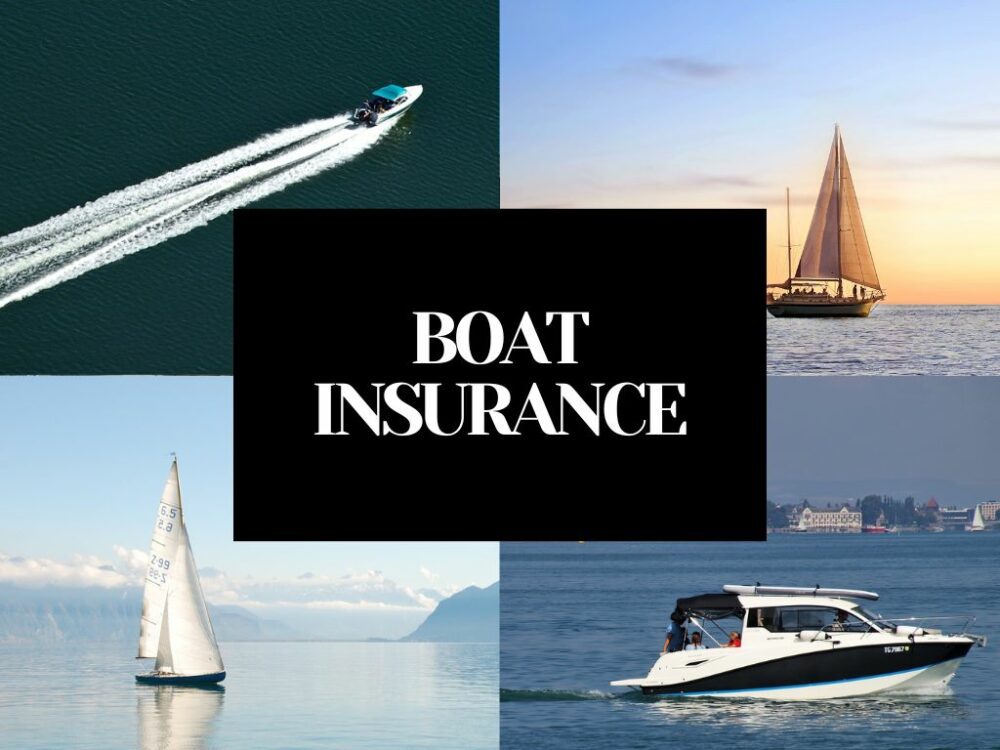
Insurance is often viewed as a necessary expense, a safeguard against life’s unpredictable events. In the realm of maritime pursuits, boat insurance is a critical aspect of owning and operating watercraft. Just as automobile owners seek coverage tailored to their vehicles and driving habits, boat owners must navigate the waters of specialized insurance policies. Two niche areas that often arise are ‘high performance boat insurance’ and ‘commercial boat insurance’. Let’s unravel the definitions, differences, and delve into some examples.
High Performance Boat Insurance
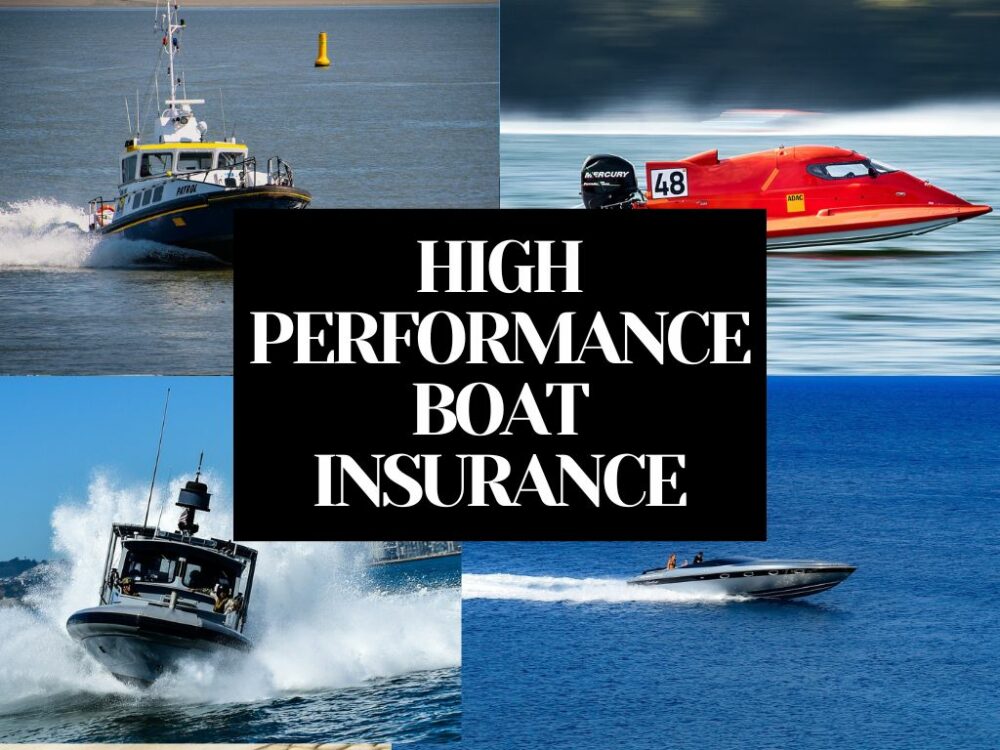
Definition: High performance boat insurance is designed specifically for boats that are built for speed. These are typically vessels capable of reaching and exceeding speeds of 60 miles per hour. Given the greater risks associated with high-speed activities on the water, these boats demand a specialized insurance policy.
Why it’s Different: The potential for accidents, injuries, and damages are higher for speed boats as compared to more leisurely watercraft. Additionally, high-performance boats often come with higher price tags, making potential loss or damage significantly more costly. As such, insurance for these boats is more intricate and, often, pricier than standard boat insurance.
Example: Consider Mr. Smith, a boat enthusiast who recently purchased a speedboat capable of reaching 80 mph. He frequently takes the boat out for racing events and weekend cruises. To ensure his investment is protected from potential accidents, theft, or damage, Mr. Smith would opt for a high performance boat insurance policy tailored to his needs, offering comprehensive coverage.
Commercial Boat Insurance
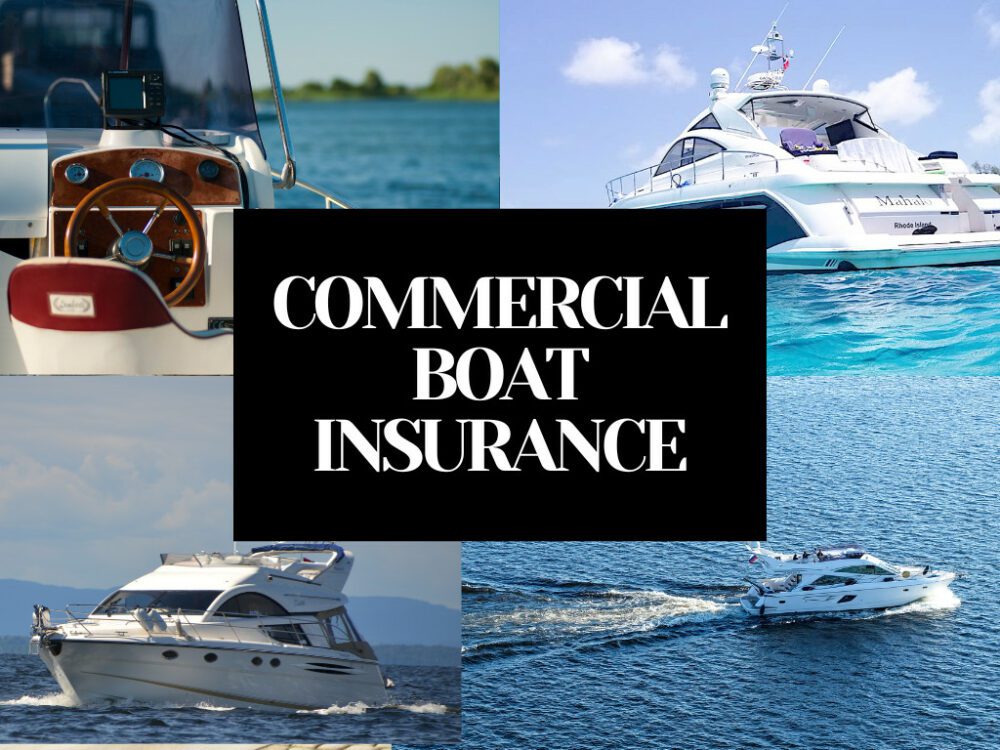
Definition: Commercial boat insurance is designed for boats and vessels that are used primarily for business purposes. This could encompass charter boats, fishing boats, tour boats, or any other vessel used to generate income.
Why it’s Different: Operating a boat for commercial purposes brings with it unique risks and responsibilities. There are liabilities involved with carrying passengers or goods, potential income loss due to boat downtime, and various other considerations that make commercial boat insurance distinct from personal boat insurance.
Example: Ms. Davis runs a small business offering eco-tours around a picturesque island. Her boat can carry up to 20 passengers and operates daily. Ms. Davis would need commercial boat insurance to cover potential liabilities associated with passenger injuries, equipment malfunctions, or business interruptions.
Classic Boat Insurance
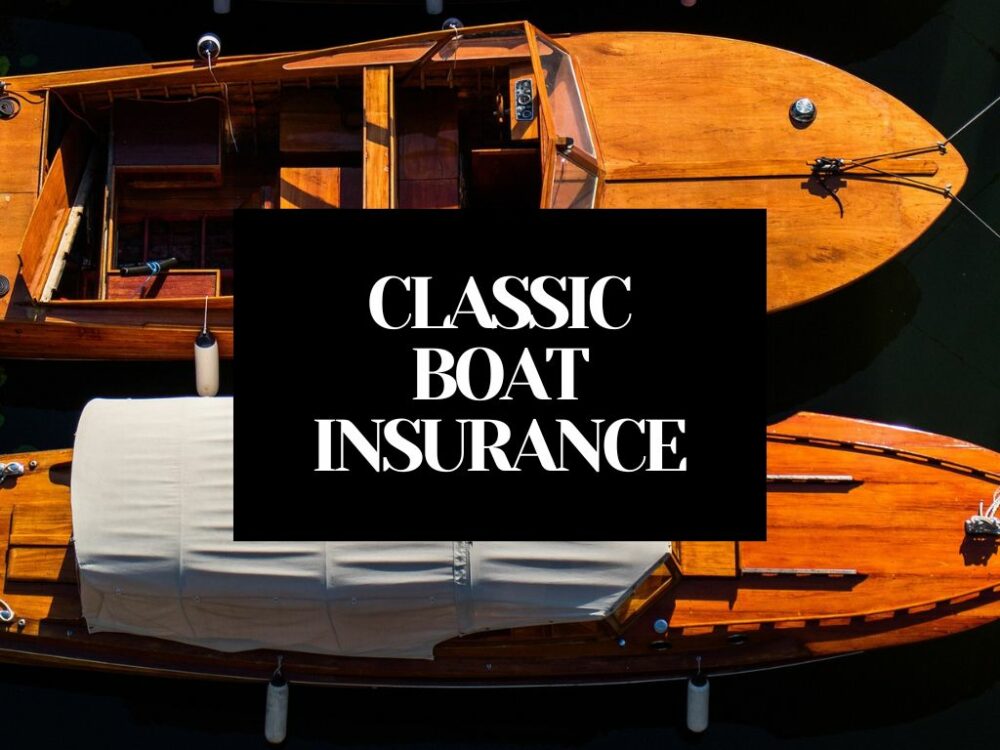
Definition: Tailored for vintage and classic boats, this covers potential damages, liability, and other risks specific to older vessels.
Example: A 1950’s classic wooden boat suffers damage at a boat show. The classic boat insurance aids in restoration costs.
Sailboat Insurance
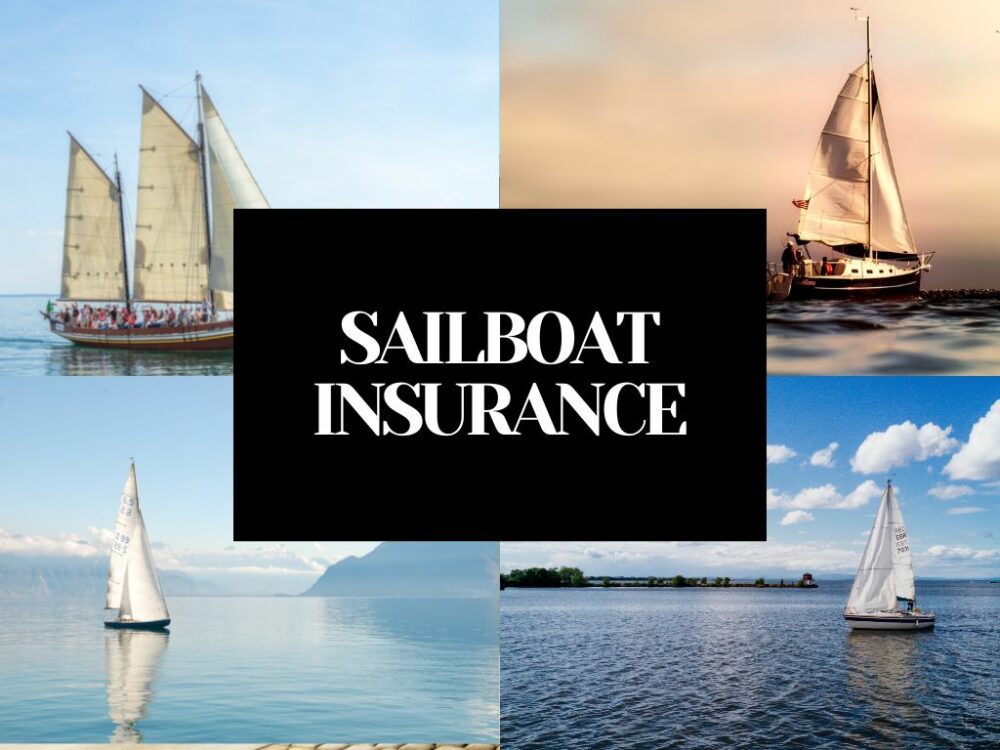
Definition: Coverage specifically for sailboats, encompassing risks like damages, theft, and liability.
Example: A sailboat is damaged due to unexpected bad weather at sea. The policy covers repair costs.
Finding the Right Coverage
Just as no two boats are identical, the same goes for insurance policies. It’s paramount for boat owners to understand their specific needs and to seek policies that offer adequate protection. This often means discussing requirements with insurance professionals who can provide guidance tailored to individual circumstances.
For high performance and commercial boat owners, understanding the nuances of these specialized insurance categories is not just prudent—it’s essential. Whether you’re racing across the waves at breathtaking speeds or offering serene sunset cruises to tourists, ensuring your watercraft and business operations are protected should always be a priority.
Conclusion
At its core, insurance serves as a safety net, guarding against the unpredictability of life’s challenges and mishaps. Whether it’s for our health, home, vehicle, or ventures, insurance provides peace of mind in knowing that potential financial burdens can be mitigated, allowing us to focus on recovery, rebuilding, or simply continuing forward. While some may view it as just another expense, the value of insurance becomes immeasurably clear when faced with substantial loss or liability. In the grand tapestry of life’s financial decisions, securing appropriate insurance stands out as a hallmark of prudence and foresight, emphasizing not just the protection of assets, but also the well-being and stability of our future.
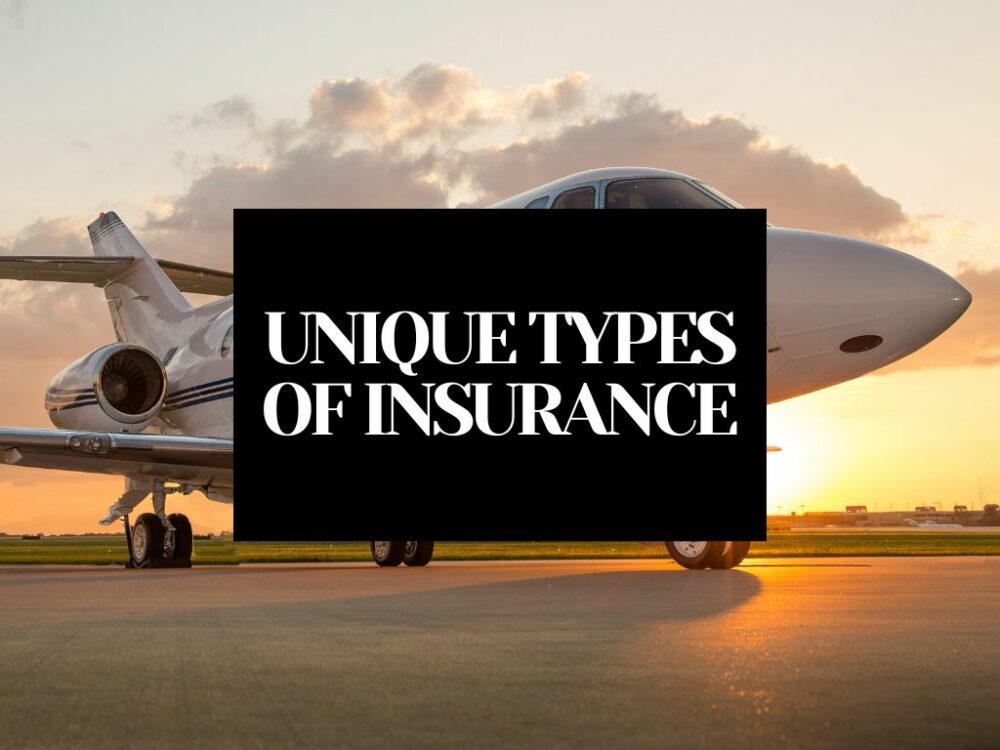

Read more
Popular Topics: Stocks, ETFs, Mutual Funds, Bitcoins, Alternative Investing, Dividends, Stock Options, Credit Cards
Posts by Category: Cash Flow | Credit Cards | Debt Management | General | Invest | Mini Blogs | Insurance & Risk Mgmt | Stock Market Today | Stock Options Trading | Technology
Useful Tools
Student Loan Payoff Calculator | Mortgage Payoff Calculator | CAGR Calculator | Reverse CAGR Calculator | NPV Calculator | IRR Calculator | SIP Calculator | Future Value of Annuity Calculator
Home | Blog
Our Financial Calculator Apps
Page Contents
